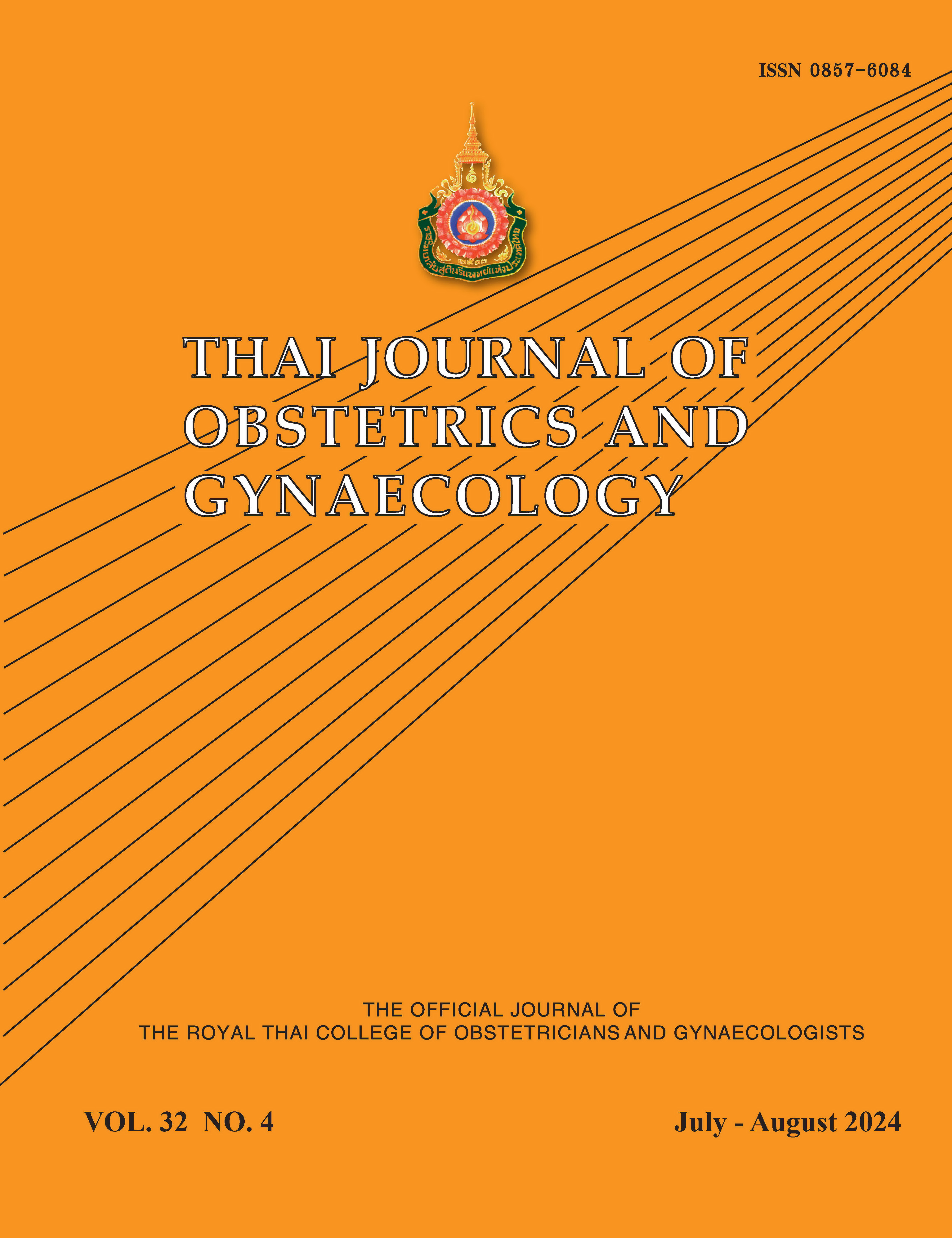Prevalence of Depressive Symptoms among Thai Reproductive-Aged Woman with Polycystic Ovary Syndrome and Associated Factors
Main Article Content
Abstract
Objectives: This study aimed to determine the prevalence of depressive symptoms among Thai reproductive-aged woman with polycystic ovary syndrome (PCOS) and to identify factors associated with depression in this population.
Materials and Methods: A cross-sectional, questionnaire-based study was conducted at the Gynecologic Endocrinology Unit of Siriraj Hospital. The study enrolled women with PCOS between February 2022 and April 2023. The women were aged 18-45 years and met the revised Rotterdam 2003 criteria for PCOS. Participants with a prior psychiatric diagnosis or history of psychiatric medication use were excluded. Information was gathered about their background and recorded signs and symptoms of PCOS. The Patient Health Questionnaire-9 (PHQ-9) was used to assess depression and its severity. This study, scores of 9 or more indicated depressive disorder.
Results: A total of 193 PCOS women participated, with a mean age of 26.1 ± 5.4 years. Most participants exhibited oligomenorrhea (96.9%) and hyperandrogenism (93.8%). The prevalence of depression was 39.9%, with severity categorized as mild (28.0%), moderate (11.4%), and severe (0.5%). Univariate analysis identified that being a student, having no savings from income, the presence of acanthosis nigricans, and hyperandrogenism were significantly associated with depression. Multiple logistic regression analysis further revealed that only the absence of savings was significantly associated with depression in this population.
Conclusion: The prevalence of depression in Thai PCOS women, as categorized by the PHQ-9, was 39.9%. A lack of savings from income was a significant factor associated with depression in Thai reproductive women with PCOS.
Article Details

This work is licensed under a Creative Commons Attribution-NonCommercial-NoDerivatives 4.0 International License.
References
Rotterdam, ESRM, ASRM-Sponsored PCOS, consensus workshop group. Revised 2003 consensus on diagnostic criteria and long-term health risks related to polycystic ovary syndrome (PCOS). Hum Reprod 2004;19:41-7.
Teede H, Deeks A, Moran L. Polycystic ovary syndrome: a complex condition with psychological, reproductive and metabolic manifestations that impacts on health across the lifespan. BMC Med 2010;8:41.
Wang Y, Ni Z, Li K. The prevalence of anxiety and depression of different severity in women with polycystic ovary syndrome: a meta-analysis. Gynecol Endocrinol 2021;37:1072-8.
Tan J, Wang QY, Feng GM, Li XY, Huang W. Increased risk of psychiatric disorders in women with polycystic ovary syndrome in southwest China. Chin Med J (Engl) 2017;130:262-6.
Damone AL, Joham AE, Loxton D, Earnest A, Teede HJ, Moran LJ. Depression, anxiety and perceived stress in women with and without PCOS: a community-based study. Psychol Med 2019;49:1510-20.
Kiejna A, Piotrowski P, Adamowski T, Moskalewicz J, Wciorka J, Stokwiszewski J, et al. [The prevalence of common mental disorders in the population of adult Poles by sex and age structure - an EZOP Poland study]. Psychiatr Pol 2015;49:15-27.
Kongsuk T, Supanya S, Kenbubpha K, Phimtra S, Sukhawaha S, Leejongpermpoon J. Services for depression and suicide in Thailand. WHO South East Asia J Public Health 2017;6:34-8.
Zenebe Y, Akele B, W/Selassie M, Necho M. Prevalence and determinants of depression among old age: a systematic review and meta-analysis. Ann Gen Psychiatry 2021;20:55.
Hart R, Doherty DA. The potential implications of a PCOS diagnosis on a woman’s long-term health using data linkage. J Clin Endocrinol Metab 2015;100: 911-9.
Kerchner A, Lester W, Stuart SP, Dokras A. Risk of depression and other mental health disorders in women with polycystic ovary syndrome: a longitudinal study. Fertil Steril 2009;91:207-12.
Kroenke K, Spitzer RL, Williams JB. The PHQ-9: validity of a brief depression severity measure. J Gen Intern Med 2001;16:606-13.
Sun Y, Fu Z, Bo Q, Mao Z, Ma X, Wang C. The reliability and validity of PHQ-9 in patients with major depressive disorder in psychiatric hospital. BMC Psychiatry 2020;20:474.
Lotrakul M, Sumrithe S, Saipanish R. Reliability and validity of the Thai version of the PHQ-9. BMC Psychiatry 2008;8:46.
Wang Y, Ni Z, Li K. The prevalence of anxiety and depression of different severity in women with polycystic ovary syndrome: a meta-analysis. Gynecol Endocrinol 2021:1-7.
Cinar N, Kizilarslanoglu MC, Harmanci A, Aksoy DY, Bozdag G, Demir B, et al. Depression, anxiety and cardiometabolic risk in polycystic ovary syndrome. Hum Reprod 2011;26:3339-45.
Pastore LM, Patrie JT, Morris WL, Dalal P, Bray MJ. Depression symptoms and body dissatisfaction association among polycystic ovary syndrome women. J Psychosom Res 2011;71:270-6.
Hollinrake E, Abreu A, Maifeld M, Van Voorhis BJ, Dokras A. Increased risk of depressive disorders in women with polycystic ovary syndrome. Fertil Steril 2007;87:1369-76.
Pasch L, He SY, Huddleston H, Cedars MI, Beshay A, Zane LT, et al. Clinician vs self-ratings of hirsutism in patients with polycystic ovarian syndrome: Associations with quality of life and depression. JAMA Dermatol 2016;152:783-8.
Besenek M, Gurlek B. Hyperandrogenism in polycystic ovary syndrome affects psychological well-being of adolescents. J Obstet Gynaecol Res 2021;47:137-46.
Leerasiri P, Wongwananuruk T, Indhavivadhana S, Techatraisak K, Rattanachaiyanont M, Angsuwathana S. Correlation of clinical and biochemical hyperandrogenism in Thai women with polycystic ovary syndrome. J Obstet Gynaecol Res 2016;42: 678-83.
Almeshari WK, Alsubaie AK, Alanazi RI, Almalki YA, Masud N, Mahmoud SH. Depressive and anxiety symptom assessment in adults with polycystic ovarian syndrome. Depress Res Treat 2021;2021:6652133.
Phoosuwan N, Eriksson L, Lundberg PC. Antenatal depressive symptoms during late pregnancy among women in a north-eastern province of Thailand: Prevalence and associated factors. Asian J Psychiatr 2018;36:102-7.
Oliveira ES, Silva A, Silva K, Moura TVC, Araujo AL, Silva A. Stress and health risk behaviors among university students. Rev Bras Enferm 2020;73: e20180035.
Lun KW, Chan CK, Ip PK, Ma SY, Tsai WW, Wong CS, et al. Depression and anxiety among university students in Hong Kong. Hong Kong Med J 2018;24: 466-72.
Livadas S, Chaskou S, Kandaraki AA, Skourletos G, Economou F, Christou M, et al. Anxiety is associated with hormonal and metabolic profile in women with polycystic ovarian syndrome. Clin Endocrinol (Oxf) 2011;75:698-703.
Cooney LG, Lee I, Sammel MD, Dokras A. High prevalence of moderate and severe depressive and anxiety symptoms in polycystic ovary syndrome: a systematic review and meta-analysis. Hum Reprod 2017;32:1075-91.


